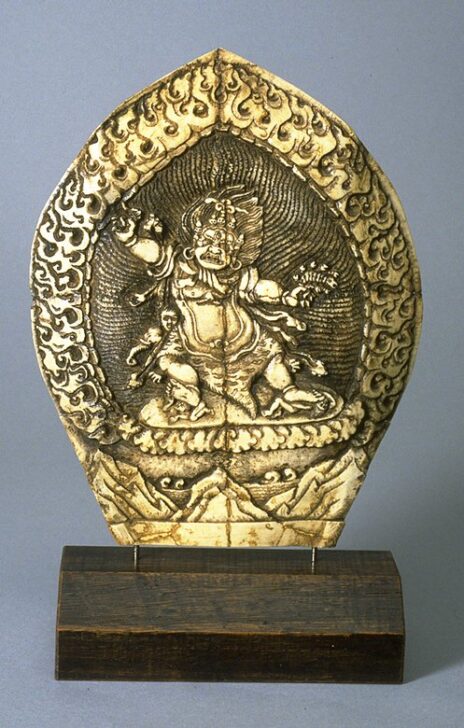Guru Dragpo Votive Plaque, in the shape of a lotus petal
Tibetan; Nepali

Description
March 28 2009
Wrathful or fierce deities are characteristic of the art of Tantric Buddhism. Terrifying in appearance, these ferocious beings are actually positive forces that help the faithful combat both external and internal obstacles to enlightenment. External threats to salvation include demons and disease; inner states that keep one from enlightenment include anger, ignorance, sloth, and lust.
Guru Dragpo (“wrathful teacher” in Tibetan), a representation of the famed eighth-century Tantric Buddhist master, Padmasambhava, can be identified by the nine-headed scorpion he holds. Invited to Tibet by King Trisong Detsen (ruled 755–797) to subdue the fierce native deities that were preventing Buddhism from becoming established, Padmasambhava transformed these demon adversaries into protectors of the Buddhist religion. Dorje Legpa, displayed nearby, is one of these “oath-bound” protectors.
(Label for UMMA Buddhist Gallery Opening Rotation, March 2009)
Subject Matter:
An incised image of Vajrapâni, the "Thunderbolt-bearer," an important bodhisattva in the Tibetan Buddhist faith, depicted in his wrathful form. He has a third eye, and his hair is depicted sweeping up and back as though on fire. He wears an elephant skin on his back (the elephant's head is just visible behond his right knee) and a tiger skin around his loins. He carries a vajra ("thunderbolt"—a pronged scepter) in his right hand. He stands in a dramatic pose (known as the "alida" stance, or "powerful kick"), often seen in wrathful deites, trampling underneath two figures that represent variously enemies of the faith or ignorance and greed.
Physical Description:
A bas-relief carving made of underbelly of tortoise shell and in the shape of a lotus petal, depicting a wrathful guardian of the Tibetan Buddhist faith. At the base of the "petal" are the tops of mountains, with the waves of the sea visible between them; in the rounded part of the "petal," a border of flames encircles a dynamic image of the bodhisattva Vajrapani in his wrathful form. The background behind Vajrapani is incised with closely spaced wavy lines, again suggesting flames.
Usage Rights:
If you are interested in using an image for a publication, please visit https://umma.umich.edu/request-image/ for more information and to fill out the online Image Rights and Reproductions Request Form.